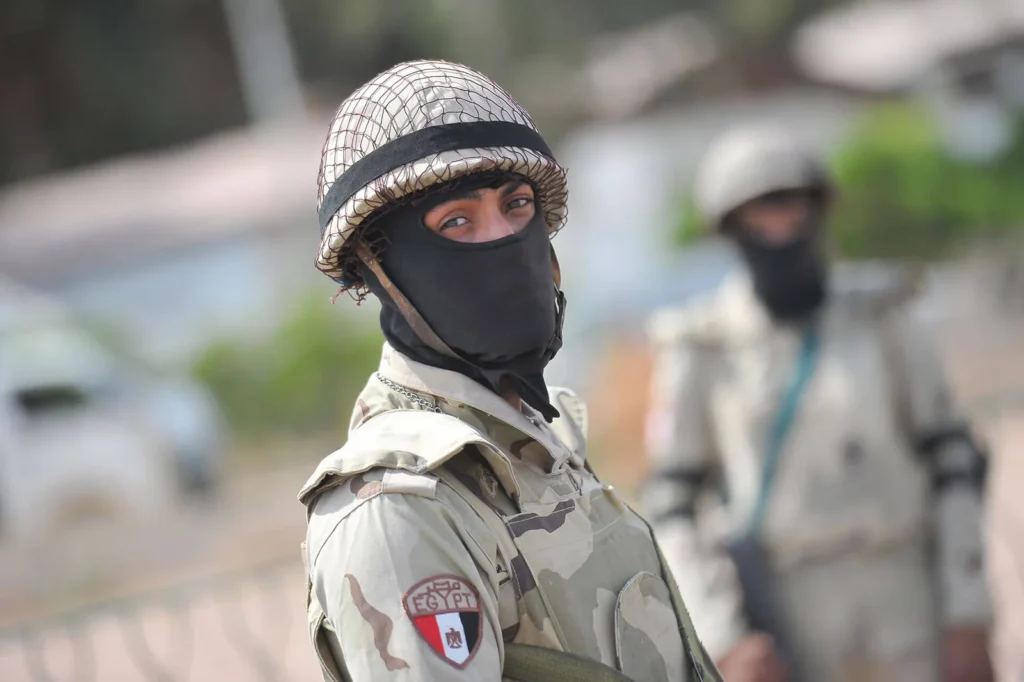Egyptian President Abdel Fattah el-Sisi has still not relinquished his emergency powers a decade after the unrest which he claims justified them. Today, the military remains in complete control of…
In early 2014, Mohamed Morsi, Egypt’s ousted president, was transferred to Tora Prison where his family and lawyers were denied access to him. The leaked recording revealed that Morsi had previously been detained in a military naval base for a few months with no public knowledge of his location. Before his appearance in Tora, Morsi was supposed to be in a prison run by the Ministry of Interior, under the supervision of the Egyptian prosecution and Egyptian judiciary. But he wasn’t, and only some generals knew his whereabouts. When he turned up in Tora, Morsi’s lawyers not only demanded visitation rights but also argued that his previous detention was illegal, thus jeopardizing the legality of his arrest and of the trial he was facing. The generals in the recordings seemed to be discussing some solutions to these legal challenges, such as instructing the minister of interior to issue a document to justify Morsi’s detention retrospectively or even slapping up a building at the naval base and calling it a jail managed by the ministry of interior.
This story sums up how the military leaders in Egypt were thinking about law and legality in the aftermath of the coup. In the years that have followed, the generals’ contempt for anything related to accountability and the rule of law has been much on display: a new constitution was written and enacted in 2014 and a presidential election was held in the same year. In 2018, the orchestrator of the coup, Abdel Fattah el-Sisi, was re-elected, and the following year, a constitutional amendment was adopted allowing him to stay in power beyond two terms and perhaps until 2034. Ten years on, the only rule in Egypt that holds true about law is that there is no rule of law.
The goal of this article is to make sense of this lawlessness. But what is lawlessness? Merriam-Webster’s thesaurus describes lawlessness as “a state in which there is widespread wrongdoing and disregard for rules and authority.” By using the word “lawlessness” I do not suggest that Egypt under the generals’ rule has no laws; what it has is rather a widespread and systemic contempt for the rule of law. The de facto law of the land is counterrevolutionary logic driven by the wishes of a divine leader.
Subversion of the judicial system
Before providing some explanations for this state of lawlessness, allow me to briefly summarize some examples of the transformations that took place in the legal and judicial system in Egypt in the aftermath of the coup.
Not only did the president, in 2019, amend the constitution to expand executive power, but his regime invested in expanding its grip over the judiciary and extending a despotic legal apparatus. As Amr Hamzawy observed, Sisi has been using “the law as a tool to restore tyranny.” In April 2017, his regime enacted a new law of Judicial Bodies in Egypt (Law no. 13/2017). The law enables the executive branch—represented by the president—to encircle the judiciary and grants the presidency the power to appoint key judges. It also allows Sisi to appoint top judges, ignoring the historical legal tradition according to which judges are nominated by their courts’ assemblies with the president only then selecting from their top choices. Even before these legal changes, the regime had dismissed judges who had publicly condemned the coup.
Sisi also expanded the security screening before hiring prosecutors; during interviews, candidates are asked directly about their view of the president, the Muslim Brotherhood and the coup regime. These prosecutors are Egypt’s future judges. The new steps ensure the hiring of regime loyalists to Egypt’s judiciary.
A significant part of restricting the judicial system is expanding the jurisdiction of military courts and granting senior military officers immunity from any crimes committed during the events of the coup and the transitional period in its aftermath. Sisi has also dared to appoint a military general and former military judge to the Egyptian Supreme Court. In addition to these changes, the coup regime dramatically enacted an arsenal of repressive laws to criminalize dissent in the street and in virtual spaces, such as the protest law (Law no. 107/2013) enacted under the interim president and approved by the Sisi regime; amending the penal code; enacting a new anti-terror law; and amending the criminal procedural law. These changes used broad definitions of terrorism to limit freedom of speech and to expand pre-trial detention to almost two years, among other things.
What is the counterrevolution trying to accomplish?
Legal scholars often distinguish between rule of law compared to rule by law. The latter is the case when authorities act above law that is only meant to be applied to citizens and not to those who rule them. As I mentioned earlier, lawlessness does not mean the complete absence of laws but refers to widespread disregard of laws. Lawlessness and rule by law are not opposed to each other in the case of Egypt’s military regime.
A brief examination of the multiple and contradictory legal goals of the counterrevolution explains how this combination of lawlessness and rule by law works. I propose that the counter-revolution has four goals in expanding its grip on legal and judicial apparatuses. These are: (1) curtailing dissent by expanding criminalization of protest and of cyber “crimes,” with some activists detained in the last several years for allegedly spreading false news in social media posts; (2) taking revenge for the January revolution by detaining tens of thousands of Egyptian youth arbitrarily without trial (according to estimates of human rights groups, the number of political prisoners in Egypt has reached no less than 60,000); (3) protecting police and military officers from charges for crimes committed during the events of the revolution and the coup (In more than one incident, Sisi explicitly told security officers that the regime would protect them against any allegations about crimes they committed, especially in the crushing of dissent); and (4) prolonging the state of emergency.
Under the pretext of saving the state and combating terrorism, the Sisi regime has expanded the definition of terrorism to include nearly all forms of dissent. True terrorism has indeed been a serious challenge for Egypt, and many innocent victims have been lost in terrorist attacks. However, because the state has accused tens of thousands of politicians and young activists of terrorism, the charge has lost its credibility. At the same time, state-endorsed extrajudicial killings have expanded dramatically. As one observer suggests, the regime is benefiting from using terrorism as an excuse to expand its grip and help Sisi stay in power as the savior of Egypt and defender of its security.
Three foundational moments
The current Constitution of Egypt was passed by referendum in January 2014. In more than one instance, President Sisi has expressed his frustration with the constitution. For example, on September 14, 2014, he stated that the constitution gave the parliament wider powers than the president out of what he called “good will,” but that countries cannot be built on good intentions. Regardless of the question of intentions, if the constitution is not the higher law of the land in Egypt, what are the real foundations upon which the coup regime is based?
There are three moments that reflect the real logic of governance in Egypt in the aftermath of the coup. These are (1) the military coup itself, (2) the “public” mandate that was given to Sisi and the military to combat terrorism on July 26, 2013, and (3) the Rabaa Massacre on August 14, 2013.
On the surface, Sisi acted as a leader of a coalition to remove then-President Morsi on the day of the coup. Sisi’s de facto power that day was based on his control of the military and of the coercive apparatus. While the so-called June 30th coalition gave Sisi the cover for his coup, the real prerequisite was Sisi’s control of the military. In a short span of time, he isolated and betrayed the so-called June 30th coalition that had supported him in the overthrow of a democratically elected president while he retained his grip on the repressive apparatus. Below the surface, a coup was an illegal and flagrant attempt by the military and other government elites to unseat an incumbent leader. A coup is a coup.
Next comes the “public” mandate of July 23, 2013. Sisi asked the people to rally to his side and the military to combat violence and terrorism, implying that the supporters of the ousted president would carry out terrorist acts in Egypt. In response to Sisi’s request, on July 26, 2013, tens of thousands rallied in Tahrir, once a revolutionary icon, carrying images of Sisi and expressing their trust in the military. This so-called popular mandate was used to justify acts of aggression against Muslim Brotherhood supporters, and the mandate was considered the real basis of the legitimacy of the coup regime. At the time, Egypt had an interim president, but Sisi, the military and the security leaders were presented as the true rulers of Egypt and the guardians of the state. One possible way to look at this mandate is that it was an extralegal authorization where the public simply gave up their sovereignty to Sisi and the military in order to confront an elusive enemy called “terrorism” that only Sisi and the military could identify.
Thirdly, on August 14, 2013, the Egyptian police and armed forces under Abdel Fattah el-Sisi raided two camps of protesters in Cairo, mostly supporters of the ousted president. One camp was located near Cairo University in Giza, at al-Nahda Square, and the second was in Rabaa Square, in front of Rabaa Al-Adawiya Mosque, located on the northern edge of Nasr City in eastern Cairo. The police and soldiers removed the encampments by force using live ammunition. Human Rights Watch documented 817 killings in the Rabaa dispersal and 87 in al-Nahda Square. They described the events as a probable crime against humanity. Indeed, the Rabaa Massacre was a case par excellence of mass extrajudicial killing.
The common thread in these foundational moments of the Sisi regime in Egypt is the lack of adherence to any form of legality. They entailed providing Sisi and the military with the carte blanche to use force without accountability.
No republic without rule of law!
The bottom line is that in Egypt’s military rule, ideas of legality and legitimacy are really meaningless with the military leaders always understanding that, since the 1952 overthrow of King Farouk, they are the anchor of the state, they own the state and the state cannot rule them since the state is their property.


